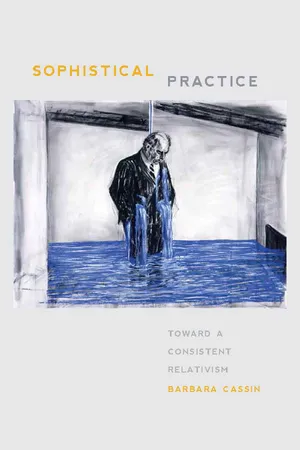
- 384 pages
- English
- ePUB (mobile friendly)
- Available on iOS & Android
About this book
Sophistics is the paradigm of a discourse that does things with words. It is not pure rhetoric, as Plato wants us to believe, but it provides an alternative to the philosophical mainstream. A sophistic history of philosophy questions the orthodox philosophical history of philosophy: that of ontology and truth in itself.In this book, we discover unusual Presocratics, wreaking havoc with the fetish of true and false. Their logoi perform politics and perform reality. Their sophistic practice can shed crucial light on contemporary events, such as the Truth and Reconciliation Commission in South Africa, where, to quote Desmond Tutu, "words,
language, and rhetoric do things, " creating things like the new "rainbow people." Transitional justice requires a consistent and sustainable relativism: not Truth, but truth for, and enough of the truth for there to be a community.Philosophy itself is about words before it is about concepts. Language manifests itself in reality only as multiplicity; different languages perform different types of worlds; and difficulties of translation are but symptoms of these differences. This desacralized untranslatability undermines and deconstructs the Heideggerian statement that there is a historical language of philosophy that is Greek by essence (being the only language able to say what "is") and today is German.Sophistical Practice constitutes a major contribution to the debate among philosophical pluralism, unitarism, and pragmatism. It will change how we discuss such words as city, truth, and politics. Philologically and philosophically rethinking the sophistical gesture, relying on performance and translation, it proposes a new
paradigm for the human sciences.
Tools to learn more effectively

Saving Books

Keyword Search

Annotating Text

Listen to it instead
Information
Table of contents
- Cover
- Half Title
- Title Page
- Copyright
- Contents
- Acknowledgments
- Half Title
- Introduction: Toward a New Topology of Philosophy
- I. Unusual Presocratics
- II. Sophistics, Rhetorics, Politics
- III. Sophistical Trends in Political Philosophy
- IV. Performance and Performative
- V. “Enough of the Truth For …”
- Notes
- Index
Frequently asked questions
- Essential is ideal for learners and professionals who enjoy exploring a wide range of subjects. Access the Essential Library with 800,000+ trusted titles and best-sellers across business, personal growth, and the humanities. Includes unlimited reading time and Standard Read Aloud voice.
- Complete: Perfect for advanced learners and researchers needing full, unrestricted access. Unlock 1.4M+ books across hundreds of subjects, including academic and specialized titles. The Complete Plan also includes advanced features like Premium Read Aloud and Research Assistant.
Please note we cannot support devices running on iOS 13 and Android 7 or earlier. Learn more about using the app